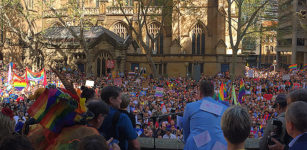Morrison’s Religious Privilege Bill Promotes Prejudice Over Equality

The federal government has just released the exposure draft of the Religious Discrimination Bill, not because there’s any evidence of widespread discrimination against people of faith, but, in reality, it’s a reaction to LGBTIQ people having had the same rights as heterosexuals afforded to them.
Scott Morrison, then treasurer, told Fairfax media in December 2017 that he was going to champion religious protection laws, citing Greens senator Nick McKim’s referring to Christmas as a “non-denominational seasonal festivity” as an example of discrimination against the religious.
But, McKim’s “mockery” was a deflection, as the now Pentecostal PM and his religious right cronies set off on their religious privilege crusade precisely because marriage equality had just been passed. And now, their proposed new laws threaten to undermine existing anti-discrimination frameworks.
The new bill, which is being pushed by followers of the majority religion, makes a folly of what anti-discrimination laws aim for: promoting equality and protecting the vulnerable. Indeed, there’s been no focus on those of the Islamic faith: the only religion to which there’s any evidence of intolerance.
And because of the inability of a few powerful politicians in Canberra to accept that equal rights apply to all people – not just those who engage in sexual activity in the same way they do – the Morrison government is seeking to legislate open slather against all minorities.
“A host of goodies for bigots”
“This is a really wide-ranging attack not just on LGBTIQ people in Australia, but against racial minorities, women, people with disabilities and old people,” said Cat Rose, co-convenor of Community Action for Rainbow Rights, formerly Community Action Against Homophobia.
“Any group who has previously won some form of protection from discrimination would be set as targets in the government’s culture war,” she continued. “These laws are about stoking hatred and emboldening bigots, and we need to be concerned about the new norm they’re creating.”
Ms Rose pointed to the “health practitioner conduct rule”, which allows any healthcare professional – “not just in private hospitals, but any nurse or doctor or even pharmacist” – to conscientiously object to the provision of a service “to anyone whose medical needs offend their religious beliefs”.
Contained is section 8 of the Bill, this rule maintains that the patient’s health service requirement in this case is actually a form of indirect discrimination being imposed upon the health practitioner to the disadvantage of their religious beliefs.
“People have rightly pointed to how far back this could take women’s right to abortion,” Ms Rose told Sydney Criminal Lawyers, “but it could even extend to a pharmacist refusing to dispense a prescription for, say, the pill or for HIV medication that has already been approved by a doctor.”
A blank cheque to discriminate
Section 41 of the Bill overrides all other anti-discrimination laws, so that “a statement of belief” doesn’t constitute discrimination. And it specifically supersedes section 17 of the Tasmanian Anti-Discrimination Act 1998, which counters biased treatment based on a wide range of attributes.
The Religious Discrimination Bill prevents the protection on statements of belief from applying to malicious statements, or ones that might harass, vilify or promote hatred or violence against someone, or advocates or encourages the commission of a serious offence.
However, as Law Council of Australia president Arthur Moses pointed out this week, unlike section 18C of the Racial Discrimination Act 1975 (the RDA), this section of the legislation doesn’t protect against statements that can offend, insult or humiliate.
“Section 41 is where it becomes clear how wide-ranging this bill is,” Ms Rose emphasised. “It is where it overrides all existing anti-discrimination laws that have been fought for and instituted federally and across all states.”
The LGBTIQ rights activist explained that the Tasmanian law it undermines is “Australia’s best piece of anti-discrimination law for LGBTIQ people”, and in overriding section 18C, it allows for behaviour the Liberals had wanted to enable via a 2017 amendment to the RDA if done on the basis of faith.
“Where previously people were protected from being offended, insulted or humiliated on the basis of their race,” Ms Rose made clear, “now an exceptionally high bar of proof is set, so an action needs to specifically harass or incite violence against people.”
The hypocrisy is palpable
And the Morrison government is specifically legislating to privilege the right to freedom of religion over race, sex, sexual orientation, disability and age, when religious exemptions already exist in both federal and state anti-discrimination laws.
At the federal level, religious exemptions – which allow religious institutions to conduct themselves in ways that would otherwise be classed as discriminatory – exist in the Age Discrimination Act 2004 and the Fair Work Act 2009.
Although, the most cited exemptions fall under section 38 of the Sex Discrimination Act 1984, which provides that religious educational institutions can discriminate against employees and students based on “sex, sexual orientation, gender identity, marital or relationship status or pregnancy”.
While the Ruddock religious freedoms review report – the basis for the new legislation – recommends that the provisions of section 38 be clarified, the Coalition has done nothing to address this, even though Morrison promised last year that he would revoke the law pertaining to students.
And as Ms Rose points out proposed section 18 of the Religious Discrimination Bill actually provides that it’s unlawful for an educational institution to discriminate against a student based on their religious belief. And while she asserts this is a “worthy” provision, it isn’t a “tangible issue”.
“However, there’s no such assurance for LGBTIQ children at a religious school,” she stressed. “And teachers who fail to closet themselves appropriately can and are sacked by a whole string of Christian schools”.
Time to push back
The government is currently accepting submissions on the exposure draft of the bill until 2 October. Labor MP Tanya Plibersek said while her party absolutely supports religious freedoms, she has a problem with the clause that specifically overrides Tasmanian anti-discrimination law.
Ms Rose described the opposition’s response to bill so far as being as effective as “crickets”. And she set out that while other nations have moved on since the passing of marriage equality laws, the backlash against them here – which is headed by government – has “dug in its heels”.
They’re “determined to find one way or another to make our existence and participation in society as equals an ongoing controversy”, she said, adding that while on the one hand big strides have been made with levels of acceptance, on the other, there’s clearly a huge level of prejudice that still exists.
The Liberal Party in 2017 made the entire nation undertake the postal vote on same-sex marriage. Following the majority voting “Yes”, it then spit the dummy and initiated the religious freedoms debate. And now it wants to open the door to all forms of discrimination currently outlawed.
“If we don’t push them back on this there could be fallout for decades to come,” Ms Rose warned, “as anti-discrimination legislation is rolled back to give those with bigoted views special protection afforded to no one else.”







